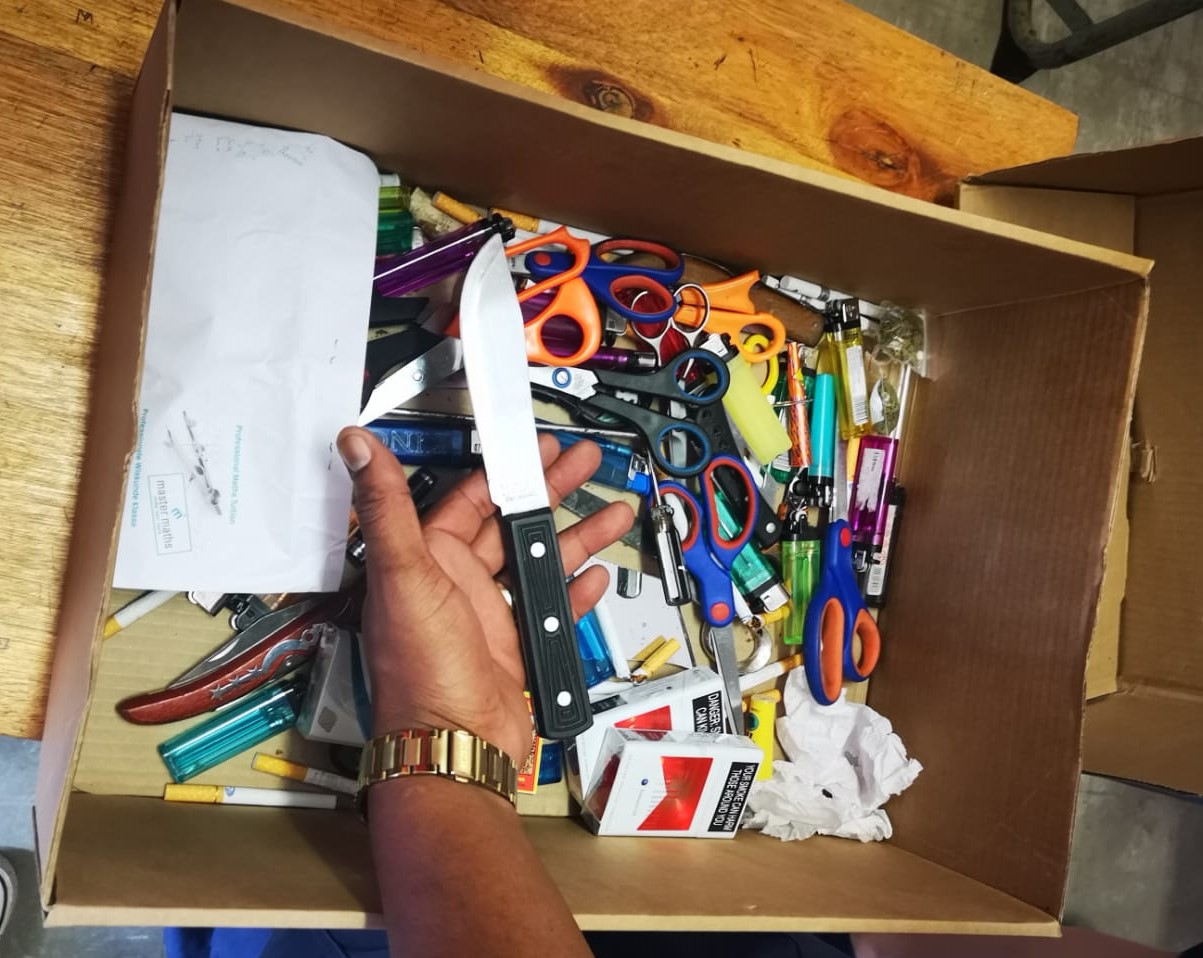Knives, screwdrivers and dagga were among the items confiscated from a Cape Town High School during a joint search and seizure operation on Thursday.
Western Cape Education Minister Debbie Schäfer and Western Cape Minister for Community Safety, Alan Winde oversaw the joint operation between the Education department and South African Police Service at Woodlands High School in Mitchells Plain.
It forms part of a broader campaign to improve safety at schools, with the random searches aiming to deter students from bringing dangerous weapons or harmful substances onto the school premises.
Some of the items that were confiscated include: lighters and cigarettes, sharp scissors, knives, screwdrivers, a pair of handcuffs, drug paraphernalia and dagga.


Schäfer said the visit was prompted by concern for the safety of learners and educators due to a flare up gang violence throughout the province. She added that concerns have been raised that weapons are being carried into schools.
“Safe and secure learning environments are essential if we are to ensure that quality education is delivered. It is imperative that our schools remain weapon and drug free,” Schäfer said in a statement.


Recent statistics by the departments Safe Schools Directorate have recorded an increase in drug and weaponry being brought onto the school premises despite the code of conduct prohibiting this.
According to the directorate, where there were 177 instances of drugs found on learners in 2017, that number increase to 194 in 2018. Fifty-six instances of learners possessing weapons were recorded in 2017 and had increased to 78 in 2018.
“This is of grave concern to me and it is for this reason that the WCED works with SAPS to conduct random search and seizure operations at schools across the province.”

She further highlighted that the possibility of learners possessing alcoholic liquor or illegal drugs “directly contributes to the challenges of providing an education of progressively better quality for all learners.”
The searched school is in an area where gangsterism and crime are rife and, as MEC Alan Winde pointed out, students are often targeted.
“Our big issue at the moment here is gangsterism and drugs, that’s why (these operations) are so important at a school level because those are the target market of these unscrupulous drug-dealers. The gangsters are subtracting from the chances that our children face. They target young people and that’s the sad part. These are the future(s) of our province and our country so we need to ensure they get the best chance in life,” said Winde.
Winde further urged parents and School Governing bodies to ensure requests are made to their nearest police stations as SAPS are not otherwise permitted to act.
“Police do these a number of times in schools but the act doesn’t allow them to just enter a school- they need to be approached by the school and its governing body. We also need the parents requesting this to happen. Together we can reduce the pressure that’s put on young people.”
Meanwhile, Acting Principal Sandra Smith became emotional during an interview when asked if she felt for her learners. Smith explained that the economic position of most parents stop them from even being able to pay registration fees, let alone the school fees.
Smith, who has worked at the school for 37-years, noted however that although there are pupils who admit to belonging to gangs, gangsterism has not been a problem. She noted that it seemed the different gangs recently came to a truce and there has been no gang-related violence at the school this year. There is, however, still the prevalence of drugs and intimidation of students.
“Normally when you do find a knife, the children will tell you its for protection. There are children who are being threatened on a daily basis. They’re being coerced to belong to a gang or to sell drugs for the gangsters. If they refuse they are being haunted.”
One of her main concerns was that students at the school who manage to complete school, have little to no chance of furthering their education beyond a matric certificate. Despite this, Smith remains hopeful for her students, having said that underprivileged schools could work to upskill their pupils where finances are lacking.
“I feel we miss the bulk of our learners where there’s no money to go further, but can’t we develop their skills? We should look more at how we can change schools from academic to skill based to prepare them for the work place. We are moving into the forth industrial revolution but in 2030 (they) talk about the “pleasure economy”- things like our beauticians and so,” suggested Smith.
Schäfer went on to say that these operations aim to deter students from participating in criminal activity.
“We take a zero-tolerance approach to drugs, if students are found with drugs we take immediate disciplinary action or ask the school to do so. these operations are being conducted periodically and students should know that if they are found with these substances, we will find them and there will be serious consequences. The same applies to violence.”
The Education MEC said the students found with these items will face disciplinary action and counselling where needed.
“They can be expelled from school, which we really don’t want. We would like (students) to see on their own the negative impacts of what they’re doing on other people and their future prospects.”






 WhatsApp us
WhatsApp us 

